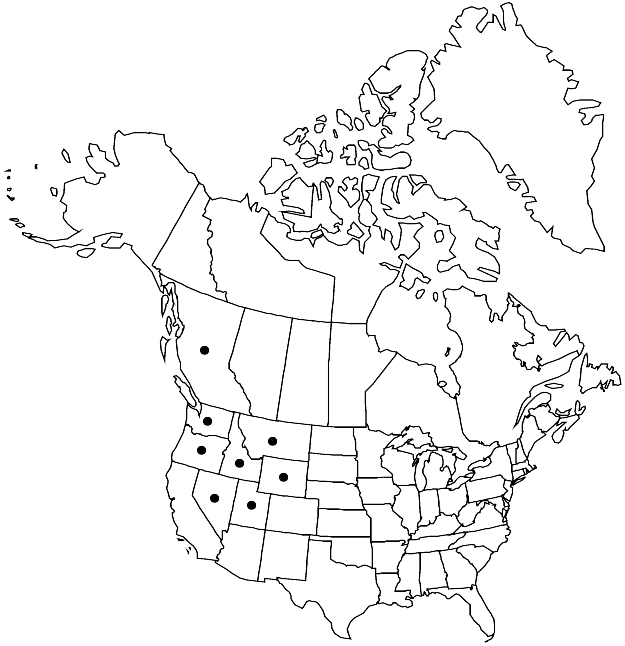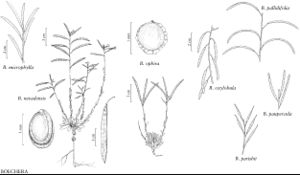Boechera microphylla
Vasc. Pl. Wyoming ed. 3, 376. 2001.
Perennials; long-lived; (cespitose); sexual or apomictic; caudex woody. Stems 1 or several per caudex branch, arising from center or margin of rosette near ground surface, 0.8–2.8(–3.5) dm, sparsely pubescent proximally, trichomes simple and subsessile, 2-rayed, 0.3–0.6 mm, glabrous distally. Basal leaves: blade oblanceolate to linear-oblanceolate, 1–4(–6) mm wide, margins entire or subapically toothed, ciliate proximally, trichomes (simple), to 0.6 mm, surfaces densely pubescent, trichomes short-stalked, 4–8-rayed, 0.05–0.1 mm. Cauline leaves: 2–6, not concealing stem; blade auricles 0.5–1.5 mm, surfaces of distalmost leaves glabrous. Racemes 5–17-flowered, usually unbranched. Fruiting pedicels ascending to divaricate-ascending, straight, 4–14 mm, glabrous. Flowers ascending at anthesis; sepals glabrous or pubescent; petals lavender to purple, 3.5–5.5 × 1–1.8 mm, glabrous; pollen ellipsoid or spheroid. Fruits ascending to divaricate-ascending, not appressed to rachis, not secund, straight to slightly curved, edges parallel, 3–7 cm × 1–1.5 mm; valves glabrous; ovules 52–72 per ovary; style 0.05–0.3 mm. Seeds uniseriate, 1–1.5 × 0.7–1 mm; wing often distal, ca. 0.1 mm wide. 2n = 14, 15.
Phenology: Flowering Apr–Jun.
Habitat: Cliffs and rocky slopes in sagebrush, mountain shrub, and open conifer forests
Elevation: 400-2400 m
Distribution

B.C., Idaho, Mont., Nev., Oreg., Utah, Wash., Wyo.
Discussion
Boechera microphylla is recognizable by its minute (0.05–0.1 mm), 4–8-rayed leaf trichomes, mat-forming habit, simple and 2-rayed trichomes on stems proximally, and ascending fruits. Both sexual and apomictic collections are known; further study is needed to determine whether they truly are conspecific. The taxa traditionally treated as Arabis (Boechera) microphylla vars. macounii and thompsonii are here recognized as B. macounii and B. cascadensis, respectively (see M. D. Windham and I. A. Al-Shehbaz 2007 for detailed comparison).
Selected References
None.
